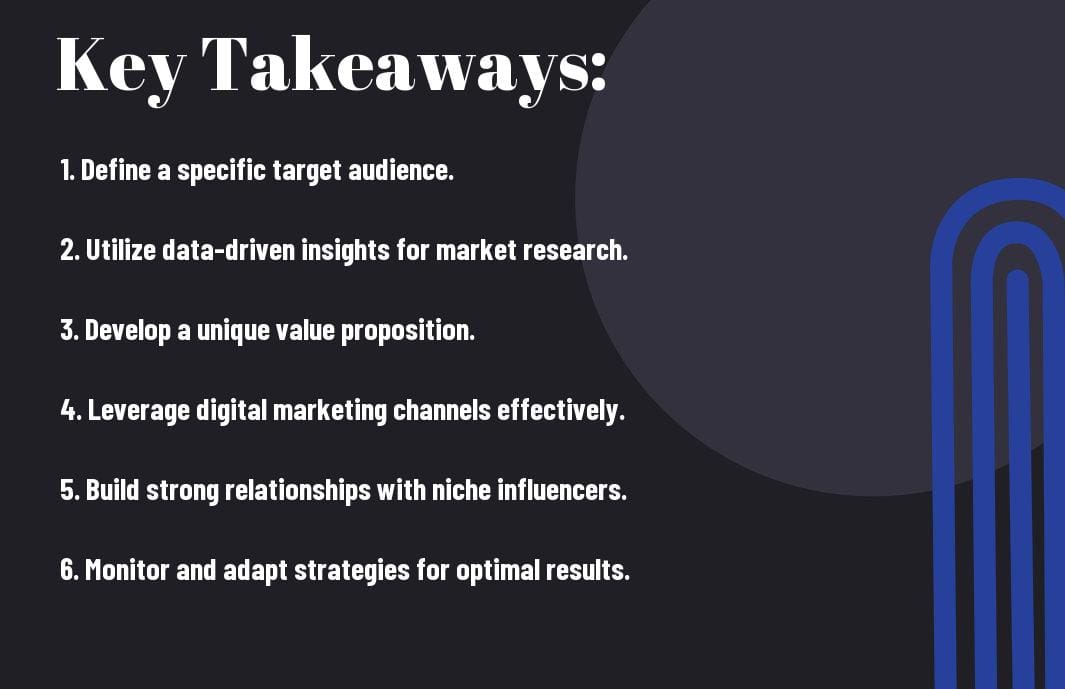Navigating the ever-evolving landscape of modern niche marketing requires a unique blend of creativity, data analysis, and strategic execution. In a saturated digital world, carving out a profitable niche and standing out from the competition is paramount for business success. This blog post will investigate into key strategies that can propel your marketing efforts to new heights, helping you connect with your target audience on a deeper level and drive significant results. Discover how to identify lucrative niches, create compelling content, and leverage the power of digital platforms to optimize your marketing efforts and achieve success in the modern business world.
Key Takeaways:
- Understanding your target audience: Identifying and segmenting your audience based on specific demographics, behaviors, and interests is crucial for effective niche marketing.
- Creating personalized and relevant content: Tailoring your messaging and content to resonate with your niche audience is key in driving engagement and building brand loyalty.
- Utilizing data-driven insights and analytics: Leveraging data to track and measure the success of your niche marketing campaigns allows for continuous optimization and improvement of strategies for long-term success.

Understanding Your Niche
Identifying Your Target Audience
While begining on the journey of modern niche marketing, the first crucial step is to identify your target audience. Understanding who your ideal customers are will help you tailor your marketing strategies to meet their specific needs and preferences. Conduct thorough research to define their demographics, interests, and pain points to create a precise customer profile.
Analyzing Market Demand and Competition
For a successful niche marketing strategy, analyzing market demand and competition is key. Evaluate the demand for your product or service within your chosen niche. Identify your competitors and assess their strengths and weaknesses. This analysis will help you position your brand uniquely in the market and capitalize on any gaps or opportunities that exist.
Another important aspect to consider is conducting a SWOT analysis to gauge your own strengths, weaknesses, opportunities, and threats. This will provide a comprehensive understanding of your market positioning and guide your strategic decision-making process.

Developing a Niche Marketing Strategy
Positioning Your Brand Effectively
Not all niche marketing strategies are created equal. Positioning your brand effectively within a niche market requires a deep understanding of your target audience and competitors. One must identify what sets their brand apart and communicate this unique selling point clearly and consistently across all marketing channels.
Creating a Unique Value Proposition
Positioning your brand in a unique and compelling way is crucial for standing out in a crowded marketplace. One must establish a unique value proposition that clearly communicates the benefits of their product or service, while also addressing the pain points of their target audience. This can create a strong emotional connection with customers and differentiate your brand from competitors.
Plus, a unique value proposition should be concise, memorable, and easy to understand. It should clearly communicate the value your brand offers and why customers should choose you over competitors. By highlighting the most important and positive aspects of your brand, you can attract and retain loyal customers in your niche market.
Implementing Niche Marketing Tactics
Leveraging Social Media for Targeted Outreach
Unlike traditional marketing strategies, niche marketing allows businesses to target specific, specialized audiences with precision. Leveraging social media platforms for targeted outreach is crucial in reaching these niche audiences effectively. Any business looking to succeed in niche marketing must identify the social media channels where their target audience is most active and tailor their content to engage with them on those platforms.
Content Marketing and SEO for Niche Audiences
Marketing to niche audiences requires a different approach compared to mass marketing techniques. Tailoring content and SEO strategies to cater to the specific interests and needs of a niche audience is important for success in niche marketing. Marketing content to a niche audience involves creating high-quality, valuable content that resonates with their interests while optimizing it for relevant keywords to improve search engine visibility.
Another key aspect of content marketing and SEO for niche audiences is the importance of conducting thorough keyword research to understand the language and terms used by the niche audience. Strong keyword optimization and creating niche-specific content will not only attract the target audience but also help establish the business as an authority in that particular niche.
Measuring and Optimizing Performance
Key Metrics for Niche Marketing Success
Now, with niche marketing, it is crucial to identify and track the key performance metrics to evaluate the effectiveness of your strategies. These metrics may include customer acquisition cost, customer lifetime value, conversion rates, and engagement metrics. By analyzing these metrics, you can gain valuable insights into the performance of your niche marketing efforts and make data-driven decisions to optimize your campaigns for success.
Continuous Improvement and Adaptation
Niche marketing is all about continuous improvement and adaptation to ensure long-term success in reaching your target audience. With the ever-evolving consumer preferences and market trends, it is imperative to stay agile and responsive. By monitoring your key performance indicators regularly and staying updated with industry developments, you can make necessary adjustments to your strategies to stay ahead of the competition.
This approach allows you to identify areas of improvement, capitalize on successful tactics, and mitigate any potential risks or pitfalls in your niche marketing campaigns. By staying proactive and focused on optimizing your performance, you can enhance your competitiveness and maximize your return on investment in the niche market.
Final Words
Drawing together various strategies and insights, it becomes evident that navigating modern niche marketing requires a deep understanding of your audience, a commitment to consistent branding, and a willingness to adapt to changing trends. By implementing the right tactics, you can position your brand for success in a competitive market. Bear in mind, the key to success lies in continuously assessing and refining your approach to meet the evolving needs of your niche audience. Embrace innovation, stay connected with your customers, and always strive to deliver value–these are the cornerstones of a successful niche marketing strategy. With dedication and perseverance, your brand can thrive and stand out in today’s competitive landscape.
FAQ
Q: What is niche marketing?
A: Niche marketing is a marketing strategy that focuses on targeting a specific segment of the market that has unique needs and preferences. By catering to this specialized group, businesses can differentiate themselves from competitors and establish a strong brand presence.
Q: How can businesses identify their niche market?
A: Businesses can identify their niche market by conducting market research to analyze consumer behavior, preferences, and trends. They can also look at their existing customer base to identify patterns and common characteristics among their most loyal customers. By identifying a niche market, businesses can tailor their products and marketing strategies to better meet the needs of their target audience.
Q: What are some strategies for success in modern niche marketing?
A: Some strategies for success in modern niche marketing include creating personalized marketing campaigns, leveraging social media and digital platforms to reach target audiences, partnering with influencers or industry experts to increase brand visibility, and continuously analyzing and adapting marketing strategies based on consumer feedback and market trends. By staying agile and focused on meeting the needs of their niche market, businesses can thrive in today’s competitive landscape.




